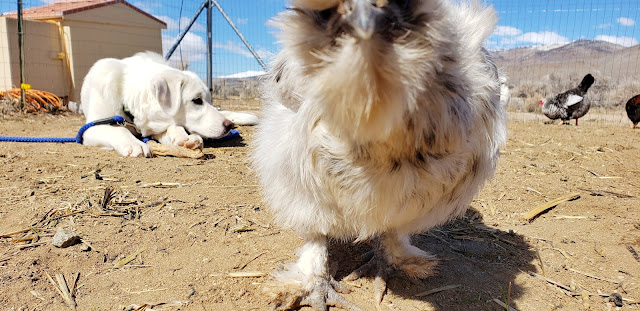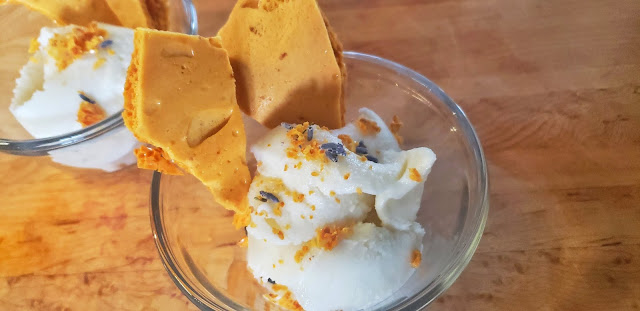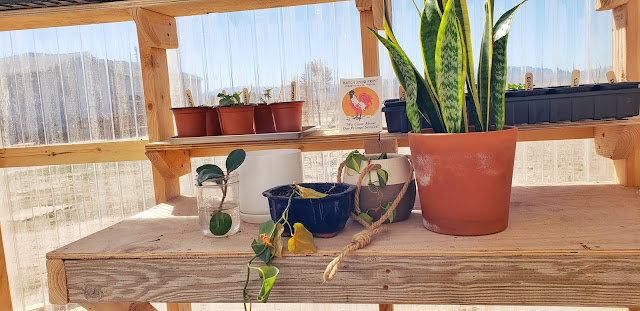For the last few days I've been doing some chicken training with Gwen.
 |
| Photo bombing silkie, Gwen in the background. |
I never really had to do this with Gus. When he was little, he would follow me into the chicken run and either settle down and chew a stick or munch on chicken poop (I know, it's super gross! But I gave up trying to get him to stop...). He never reacted to the chickens, even when they pecked his nose or jumped on top of him. He's just always been a super chill dog (until he hears a coyote, that is).
 |
| Gus (5 months old) with the silkies |
 |
| Gus (6-7 months old) with the chickens |
Gwen is a very different dog. She was a little nervous around the chickens at first and kept an eye on them when they were near. Then I caught her barking at them from inside the dog kennel (which is right next to the chicken run). And she got into a play stance a few days ago when the chickens were out in the garden. It was time for an intervention.
Here's Gwen being WAY too interested and excited by the hens while Gus busies himself with a stick and is totally indifferent:
For chicken training, I try to pick a time of day when the dogs are already pretty calm and have had a good play session so that they are a bit tired. I take Gwen, and sometimes both dogs, into the garden with leashes on and let the chickens out of their run. The leash is so that if they start to play or chase a chicken I can step on it or grab them quickly. In Gwen's case, I sometimes hold the leash. I actually trust Gus with the chickens, but because these dogs don't mature until they are at least 2 years old and he's only one, he's never unsupervised and rarely without a leash on around them.
Here's a video of Gus setting a good example:
Then I watch their behavior. I have a pocket full of treats and any time I see quiet, calm behavior -- tails down, sitting or lying down, not staring intently at the birds, the dogs get a treat. Gus gets a lot of treats. Gwen takes longer to settle down, but for her last two sessions she's done pretty well. It seems like it helps to have Gus with her because he's a really good role model, but she also gets one-on-one training.
 |
| Gwen doing pretty well. Her body language isn't quite as calm as I would like, but she's trying really hard to be good <3 |
 |
| I was really proud of Gwen here -- she went and found that stick and really settled down for the first time with the hens |
When Gwen gets too playful I correct her. I redirect her attention and have her sit or lie down and refocus back on me. If she were to cross the line and try to play with a chicken, she would get an immediate correction and a timeout (away from me and Gus, which is total torture for her).
Here's Gwen trying really hard:
I try to end on a positive note after 15-20 minutes and praise both dogs really big after the chickens are back in their enclosure. Then they get to play, or sleep, or do whatever they want.
 |
| Big goofs |
I do think Gwen's behavior is probably much for "normal" than Gus'. I'm in Facebook groups full of Livestock Guardian Dog (LGD) owners who are trying to get their dogs to not kill their fowl. LGDs were bred to guard goats, cows, sheep, etc. and they actually bond with those animals. It's rare for an LGD to bond with a bird, but they can be trained to guard them -- with a
LOT of time and patience.








Comments
Post a Comment